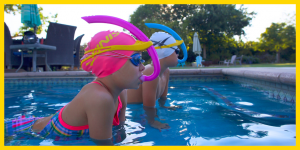December 19, 2018
Mallory Weggemann exited the pool after the first heat of the Rio Paralympic 400m freestyle and looked at her left arm. It was blue.
“And it was cold,” she said. “I wasn’t getting any circulation.”
After winning the 50m free in her Paralympic debut in 2012, Weggemann qualified for seven individual events in Rio. She left Brazil with zero medals.
Just getting to the Games was an accomplishment. On March 5, 2014, the swimmer had what she called a horrific fall to a shower floor when her bench collapsed from underneath her in a New York City accessible hotel room.
She suffered permanent nerve damage and lost both the grip in her left hand and about 75 percent of function in that arm. She considered retirement while forced out of the pool for several months. But she returned and swam through the pain.
As difficult as the last two years of that Paralympic cycle had been, she was not prepared for the first two years of the Tokyo 2020 path.
“I would say it was harder than being paralyzed,” Weggemann said, referring to 2008, when she lost movement from the waist down while receiving epidural injections to treat shingles. She was 18 years old.
Weggemann did not swim competitively from the end of the Rio Games until September. She expected to take a break after her second Paralympics, but not two years.
Her time away from the pool began on her terms. Weggemann wanted to walk at her Twin Cities wedding on Dec. 30, 2016, so she adjusted training to full-on dry land. Ninety-minute sessions with physical therapists, using leg braces and forearm crutches.
“And skirts that would cover my feet,” she said. “Mimic what it would be like with a wedding dress.”
Her dad, Chris, the last person in her family to see her walk in 2008, and her fiance, Jeremy Snyder, whom she met in 2011, joined her to practice. Weggemann was determined to stride down the aisle with Chris and share a first dance with Jeremy, eye to eye for essentially the first time, to Ray LaMontagne‘s “You are the Best Thing.”
She did.
“It wasn’t so much of, in order to feel like a bride, I needed to be standing or any of that,” she said. “It was a night that just reminded me that, despite everything, life goes on. Time does heal everything. When I was injured, I never knew if I would get married, and then I had that day. It reminded me that I was surrounded by love. Wheelchair or no wheelchair, despite the circumstances that we all face in life, we all have the ability to persevere and continue to build a beautiful and bright future. That’s what that night resembled for me.”
Weggemann’s plan was to return to swimming at the start of 2017. Her medical team said she could not. Weggemann’s left arm, the one that turned blue in Rio and that she linked with her father down her wedding aisle, needed a series of tests, procedures and appointments.
“With a spinal cord injury, you use your arms for everything out of the pool, too,” she said. “My arms just were never, truly getting a break. We needed to kind of halt and get a break.”
In June 2017, she underwent a six-hour surgery removing two muscles and a rib in her upper chest. That December, another muscle was detached from her left side. At one point, Jeremy slept for two weeks on a cot next to her hospital bed.
Yet again, Weggemann was faced with the uncertainty of how her body would respond to significant loss. She went 18 months between swimming but never gave up on the sport. Even as her medical team scratched their heads for predictions.
“One thing that I’ve constantly held onto is, as a Paralympic athlete, we’re all in this sport because we’ve had to adapt,” she said. “I mean, every single athlete in the Paralympic Movement has what I’d call the war story. We’ve all had things happen in our lives, whether we were born with things or whether we acquired things later on. We all had circumstance. For me, that helped give me some sanity in a really, really difficult time.
“I just had to understand that, as my body changed, it heightened my paralysis, too. I was used to being paralyzed with two strong arms. When I didn’t have two strong arms anymore, my paralysis seemed worse to me.”
Weggemann also lost the ability to drive for that year and a half out of the pool. She relied on loved ones to do more for her than at any point since she was paralyzed nearly a decade earlier. It wasn’t until March that she could train. Not until July that she could do it long enough to be considered a workout. She raced for the first time in September before winning her first 50m free since the 2012 Paralympics at last weekend’s nationals.
“What’s made it easier now is now I have a black line to go to,” Weggemann said of the pool. “The black line is where I’ve done all of my healing.”
Weggemann said most of the national team was at the U.S. Championships, where she swam the splash and dash in 33.06 seconds. It was nearly two seconds slower than her Paralympic gold time but three hundredths faster than what she clocked in pain in Rio. She’s looking forward to the 2019 World Championships trials in April.
“This weekend was really cool to realize that I have a lot of work still to do, but I can still get up and race,” Weggemann said.
Recent Articles
Dylan Carter
Chelsea Hodges
Lorenzo Zazzeri

Introducing the Stability Snorkel Jr
Share on Social Media


